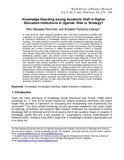| dc.contributor.author | Muhenda, Basaasa Mary | |
| dc.contributor.author | Lwanga, Elizabeth Kawuma | |
| dc.date.accessioned | 2018-05-18T08:51:07Z | |
| dc.date.available | 2018-05-18T08:51:07Z | |
| dc.date.issued | 2014-07 | |
| dc.identifier.issn | 1839-1176 | |
| dc.identifier.uri | http://www.wrbrpapers.com/static/documents/July/2014/21.%20Mary.pdf | |
| dc.identifier.uri | http://hdl.handle.net/20.500.12305/270 | |
| dc.description.abstract | A cross sectional study targeting academic staff that were purposively selected was
undertaken to ascertain whether there are behaviours of intentional knowledge retention
or intentional obstruction of knowledge sharing initiatives referred to as knowledge
hoarding. The study wanted to ascertain whether staff considered knowledge hoarding
as a plan towards the attainment of a vantage position or as a probable magnitude of
opportunity loss (risk).The study was undertaken amidst controversies that knowledge
hoarding was a likely occurrence in Higher Education Institutions (HEI‟s) in Uganda.
Findings did not confirm high incidences of behaviours perpetuating knowledge hoarding
vices though there were a few dissenting views mainly from scientists‟ conversant with
intellectual property rights and whose concern was knowledge spillages that go
unrewarded and unacknowledged that might necessitate tough measures on what, when
and with whom to share. Many respondents were in agreement with earlier researchers
who reported that sharing expertise in the academic world would rejuvenate and
expound on existing knowledge and did not agree that knowledge hoarding would in any
way assist HEI attain and or maintain any vantage position but could lead to losses of
opportunities to attain vantage positions. . Recommendations include the introduction of
a knowledge protection framework; Institutional knowledge protection, benefits and
rewards, punitive measures to handle knowledge hoarders. Educating staff on issues of
intellectual property rights, copyrights and trade secrets and introducing communities of
practice and team teaching are also recommended. Future research could investigate
scientists involved in innovations. | en_US |
| dc.language.iso | en | en_US |
| dc.publisher | World Review of Business Research | en_US |
| dc.subject | Knowledge | en_US |
| dc.subject | Knowledge hoarding | en_US |
| dc.subject | Higher Education Institutions | en_US |
| dc.subject | Uganda Management Institute | en_US |
| dc.title | Knowledge Hoarding among Academic Staff in Higher Education Institutions in Uganda: Risk or Strategy? | en_US |
| dc.type | Article | en_US |

